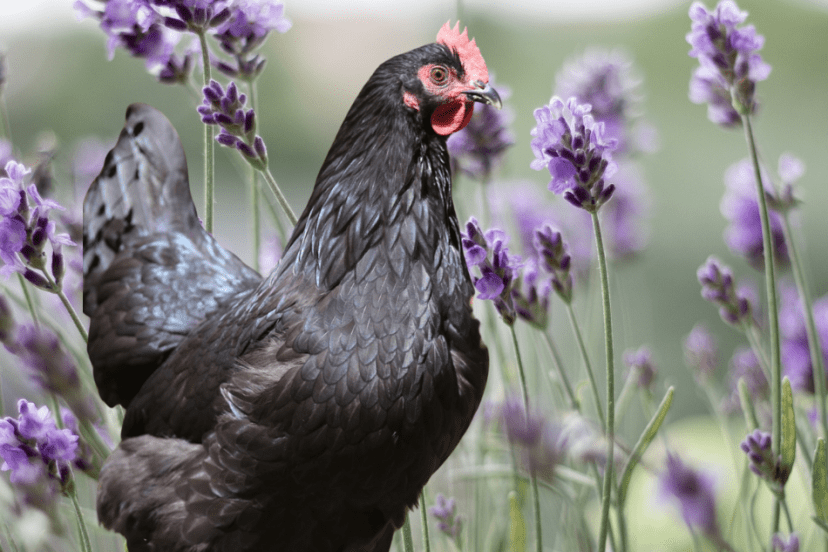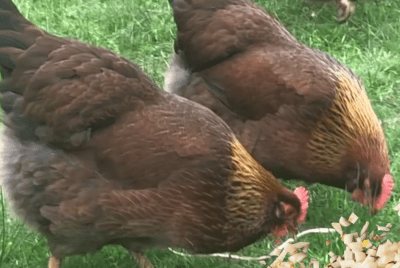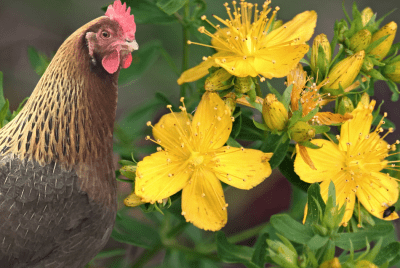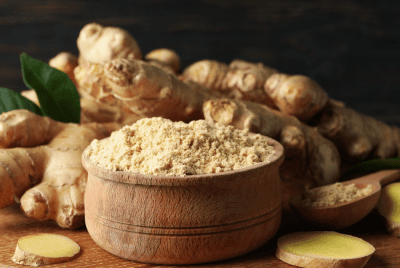Lavender Calms Laying Hens
In this article: Lavender Calms Laying Hens and Repels Pests we answer the question in many different ways. Repel pests and soothe laying hens with the power of lavender. This fragrant herb not only adds beauty to your coop but also serves as a natural solution to common problems faced by poultry keepers. Lavender’s calming properties help reduce stress in hens, leading to improved egg production and overall well-being. Additionally, its strong aroma acts as a repellent to keep pests such as flies, mosquitos, and mites at bay, protecting your flock from harmful infestations.
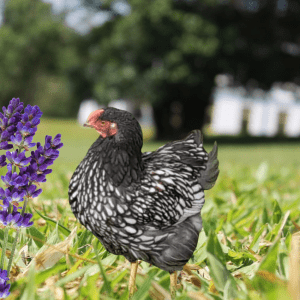
Key Takeaways about Lavender Calms laying Hens:
- Lavender is a natural plant that can help to calm laying hens due to its soothing aroma.
- The scent of lavender has been found to reduce stress and anxiety in hens, promoting a more relaxed environment.
- Lavender can also act as a natural pest repellent, deterring insects such as mites and lice that can bother hens.
- Adding dried lavender to nesting boxes or coop bedding can create a calming atmosphere for hens while helping to keep pests at bay.
- Using lavender as a natural remedy can benefit both the well-being of the hens and the overall cleanliness of the coop.
Understanding how Lavender Calms Laying Hens
Botanical Profile of Lavender
The lavender plant, scientifically known as Lavandula, is a fragrant herb in the mint family. It is characterized by its narrow, linear leaves and clusters of purple flowers. Lavender is native to the Mediterranean region but is now cultivated worldwide for its various beneficial properties.
Historical Uses in Agriculture and Medicine
The historical uses of lavender in agriculture and medicine date back centuries. Lavender has been valued for its calming effects on animals and humans alike. In agriculture, it has been used to repel pests naturally, making it a popular choice for organic farming practices. In traditional medicine, lavender has been utilized for its anti-inflammatory and antiseptic properties, aiding in wound healing and promoting relaxation.
Understanding the role of lavender in historical practices provides insight into its many applications in modern times. This versatile herb continues to be a staple in natural remedies and pest control methods due to its proven efficacy and safe use.
The Calming Effects of Lavender on Laying Hens
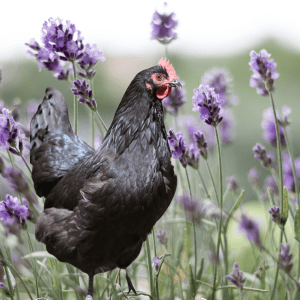
Behavioral Changes Observed in Hens Exposed to Lavender
Hens exposed to lavender have shown remarkable behavioral changes, exhibiting signs of reduced stress and increased relaxation. Studies have indicated that when lavender is introduced into the environment of laying hens, they display decreased levels of agitation and aggression, leading to a more harmonious flock dynamic. Additionally, hens have been observed to engage in more preening and dust bathing activities, indicating a higher level of comfort and contentment.
Mechanisms of Action: How Lavender Induces Calmness
Studies have suggested that the calming effects of lavender on hens can be attributed to its ability to reduce levels of stress hormones such as cortisol. The aromatic compounds present in lavender are believed to interact with the hens’ olfactory system, triggering a relaxation response in the brain. This leads to a reduction in anxiety and a sense of tranquility among the flock.
Exposed to lavender, laying hens experience a shift in their behavior towards a more peaceful and contented state. The subtle scent of lavender has been shown to have a profound effect on the well-being of hens, promoting a calm and stress-free environment within the coop.
Lavender in Hen Coops: Applications and Methods
All laying hens, especially those in commercial settings, can greatly benefit from the calming properties of lavender in their living environment. Lavender has been known to reduce stress levels in hens, resulting in improved egg production and overall well-being. Additionally, the scent of lavender acts as a natural pest repellent, helping to keep common coop pests such as mites and lice at bay.
Strategies for Incorporating Lavender into Coops
On your lavender journey for happier and healthier hens, consider planting lavender near the coop or placing dried lavender in strategic locations. Hanging dried lavender bundles in the coop or scattering lavender petals in nesting boxes can provide a soothing and aromatic environment for your feathered friends.
Dosage and Frequency Guidelines
For optimal results, it is recommended to use a moderate amount of lavender in the coop to avoid overwhelming the birds with a strong scent. Start with small amounts and gradually increase the dosage based on your hens’ response. As a general guideline, refresh the lavender every 1-2 weeks to maintain its effectiveness.
For laying hens, it is crucial to ensure that the dosage of lavender is moderate and not overpowering. While lavender can have calming effects on hens, excessive exposure may lead to aversion. By following dosage and frequency guidelines, you can create a harmonious and stress-free environment for your flock.
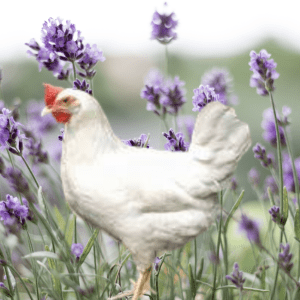
Impact on Egg Production and Quality
Influence of Lavender on Egg-Laying Rates
Rates of egg-laying in hens can be positively impacted by the presence of lavender. The calming and stress-reducing effects of lavender can help hens feel more comfortable and secure in their environment, leading to a potential increase in egg production.
Studies have shown that hens exposed to lavender aromatherapy tend to lay eggs more consistently and at a higher rate compared to those without such exposure.
Effects on Egg Quality Parameters
Quality of eggs can also benefit from the use of lavender in a hen’s environment. Not only does lavender help to repel pests that can affect egg quality, but it can also have a positive influence on the nutritional content of the eggs produced. Research has indicated that eggs from hens exposed to lavender may have higher levels of antioxidants and lower levels of stress-related hormones, resulting in eggs that are not only more nutritious but also tastier.
To ensure the best possible quality of eggs, it is important to consider the overall well-being of the hens producing them. By incorporating lavender into their environment, you can help to reduce stress levels, improve egg-laying rates, and enhance the nutritional profile of the eggs they produce. This natural solution not only benefits the hens themselves but also results in better quality eggs for consumers to enjoy.
Pest Repellent Properties of Lavender
Despite its calming effects on laying hens, lavender also offers natural pest repellent properties that can help keep your coop free from intruders. The strong aroma of lavender is effective in deterring a variety of pests, making it a valuable addition to any pest control strategy.
Types of Pests Deterred by Lavender
- Mosquitoes: Lavender acts as a natural mosquito repellent, keeping these pesky insects at bay.
- Flies: The scent of lavender is known to repel flies, preventing them from bothering your hens.
- Mites: Lavender’s properties can help deter mites, protecting your flock from these harmful pests.
- Ants: Ants are discouraged by the scent of lavender, helping to keep them out of the coop.
- Moths: Lavender can also deter moths, preventing damage to your coop and feed.
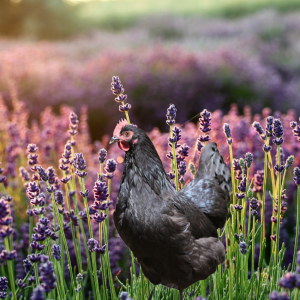
Perceiving the benefits of using lavender as a natural pest repellent can protect your hens.
But, it can also create a more pleasant environment for them to thrive in.
Lavender Compared to Traditional Pest Control Methods
| Properties of Lavender | Traditional Pest Control Methods |
| Natural | Chemical-based |
| Safe for hens | Potentially harmful to poultry |
| Pleasant aroma | Strong chemical smell |
| Environmentally friendly | May contain harmful toxins |
| Multi-purpose | Specific to certain pests |
Using lavender as a pest repellent offers a more natural and safer alternative to traditional chemical-based methods.
Its pleasant aroma not only keeps pests at bay but also provides a calming atmosphere for your hens to thrive in.
Embracing the benefits of lavender can help create a harmonious environment for your flock.
Integration with Other Natural Remedies
Synergies between Lavender and Other Herbs
For centuries, herbs have been used to promote health and well-being in various species, including poultry. When combined with lavender, some herbs can enhance the calming and pest-repelling effects of lavender on laying hens. For example, mint and oregano can complement lavender’s stress-relieving properties, creating a more potent natural remedy for your flock. Rosemary and thyme are also known to have insect-repelling qualities. These can work synergistically with lavender to keep pests at bay.
Creating a Comprehensive Natural Care System for Hens
Hens benefit from a holistic approach to care that encompasses various natural remedies. Creating a comprehensive system for your flock involves integrating lavender with other herbs, important oils, and practices that promote their well-being. In addition to lavender, incorporating herbs like chamomile, garlic, and lemon balm into their environment or diet can provide a well-rounded natural care system that supports their health and comfort.
Synergies between these natural remedies can enhance their individual effects and create a more robust defense against stress, pests, and common ailments in laying hens.
Challenges and Considerations on Lavender Calms Laying Hens
While lavender can be a beneficial addition to a chicken coop for its calming effects on laying hens and pest-repelling properties, there are several challenges and considerations to keep in mind before incorporating it into your setup.

Possible Adverse Effects and Allergic Reactions
Adverse reactions to lavender in chickens are rare, but not unheard of.
Some hens may be sensitive to the scent or oils of lavender. This could potentially cause respiratory issues or skin irritation.
It’s important to monitor your flock closely after introducing lavender to ensure there are no negative reactions.
Financial and Practical Aspects of Lavender Implementation
Financial considerations should be taken into account when deciding to implement lavender in your chicken coop.
While relatively affordable, the cost of purchasing lavender plants or important oils can add up, especially for larger coops. The best solution lies in growning your own. Have 2 pots per coop and have one inside and one outside the coop and inter change then every few days. So each get enough light to thrive.
Additionally, ongoing maintenance of lavender plants, such as pruning and replacing them when necessary, should be factored into the overall cost.
To ensure optimal benefits from using lavender in your chicken coop, it is important to source high-quality lavender plants or oils. Cheaper alternatives may not be as effective in providing the desired calming and pest-repelling effects.
Investing in reputable lavender products will ultimately benefit both your hens and the overall environment of your coop.
Summing up on Lavender Calms Laying Hens
Overall, lavender is a key herb for promoting calmness in laying hens and repelling pests in the chicken coop. Its soothing aroma can reduce stress levels in chickens, leading to happier and healthier flocks. Additionally, its natural pest-repellent properties help protect the flock from insects and parasites. This creates a more comfortable environment for the birds.
Other Articles you might Enjoy!
Squirrel Proofing your CHicken Coop
When do Chickens Start laying?
How I treat Fowl Pox Naturally!
How to deal with a wet chicken run
FAQ’s about Lavender Calms Laying Hens
Q: What is Lavender and why is it effective in calming laying hens?
A: Lavender is a fragrant herb known for its calming properties. When used around laying hens, it helps reduce stress and anxiety, creating a more peaceful environment for the birds.
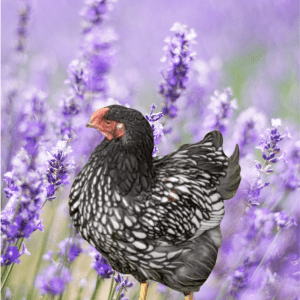
Q: How does Lavender repel pests in a chicken coop?
A: Lavender contains natural oils that act as a deterrent to pests such as flies, mosquitoes, and mites. Placing lavender plants or sachets in the coop can help keep these unwanted visitors at bay.
Q: Is Lavender safe for hens to ingest or come into contact with?
A: Lavender is safe for hens to be around, and they can even nibble on the fresh leaves in moderation. However, it’s important to ensure that they have access to a balanced diet. Lavender must not be the sole source of nutrition.
Q: How can Lavender be used to calm stressed or aggressive chickens?
A: Lavender can be used in various forms such as dried lavender sachets, imperative oils, or fresh plants. These can be placed in the coop or nesting boxes. The calming scent of lavender helps reduce aggression and stress in chickens.
Q: Are there any other benefits of using Lavender in a chicken coop?
A: In addition to calming hens and repelling pests, lavender also has antiseptic properties. This can help keep the coop clean and free from bacteria. It can also improve air quality and create a soothing environment for both chickens and their caretakers.

